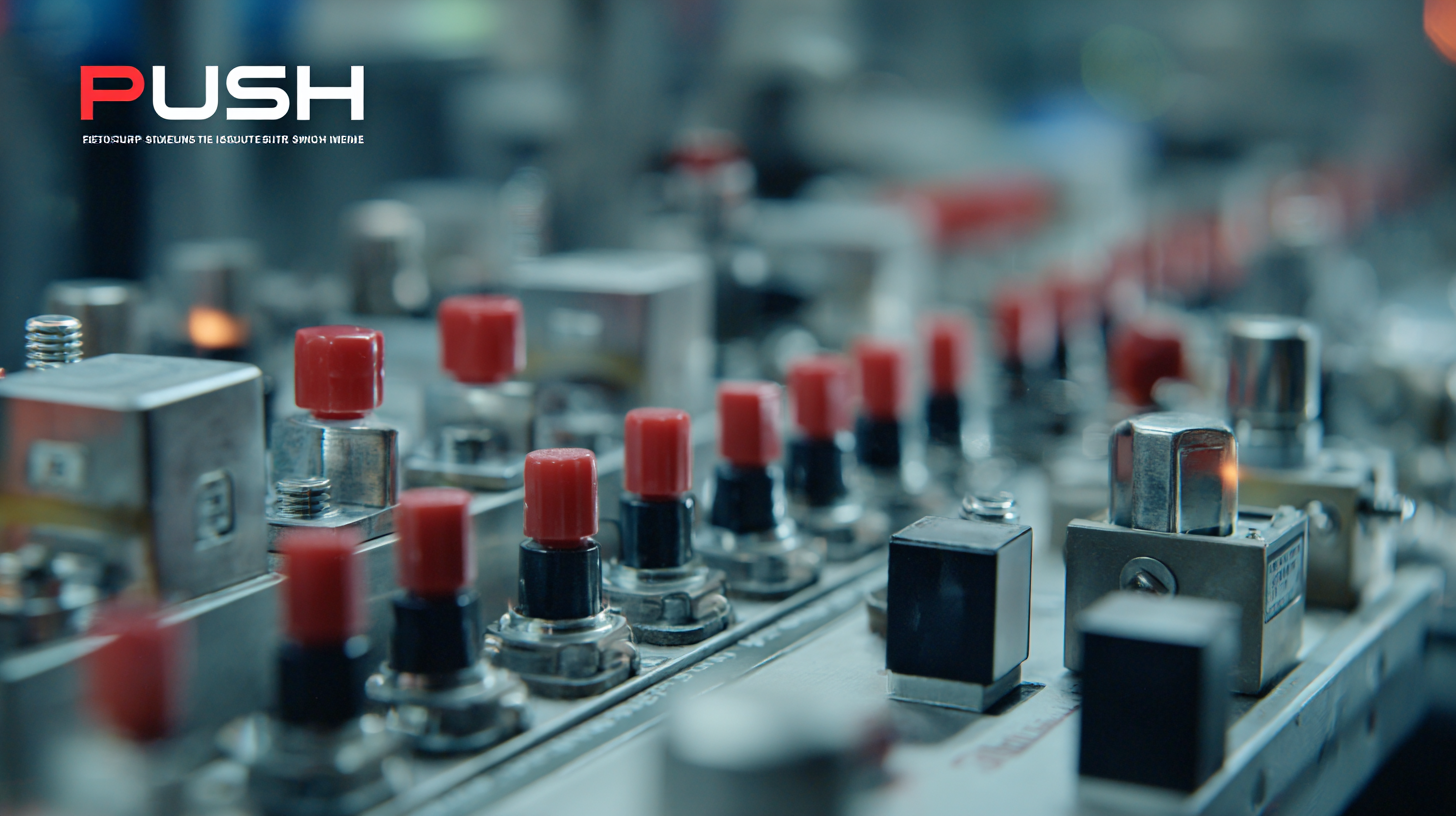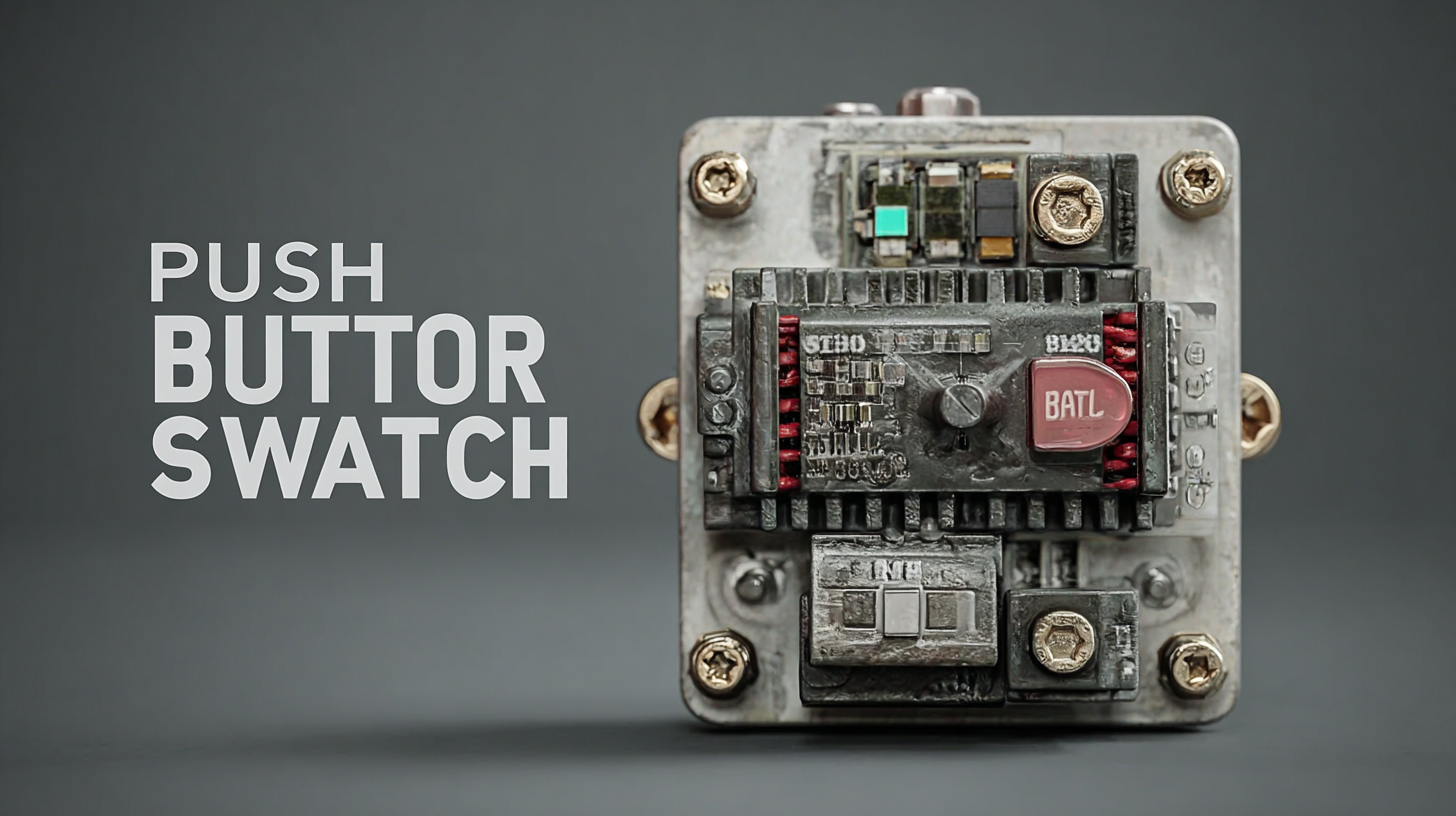2025 Market Insights: The Rise of Best Push Button Starter Switch in Global Manufacturing
The global manufacturing sector is undergoing a significant transformation, with an increasing emphasis on automation and efficiency. According to a recent report by Markets and Markets, the push button starter switch market is projected to reach $2.3 billion by 2025, growing at a compound annual growth rate (CAGR) of 7.5%. This growth is driven by the rising demand for user-friendly interface solutions that enhance operational productivity and safety. The push button starter switch, with its simple yet effective design, plays a crucial role in streamlining processes across various industries, from automotive to heavy machinery. As manufacturers seek to minimize downtime and improve their systems' overall reliability, the adoption of advanced push button starter switches becomes essential. This blog will delve into the benefits of these vital components, examining how they contribute to enhanced functionality and efficiency in modern manufacturing environments.

Market Overview: Understanding the Push Button Starter Switch Demand in 2025
As global manufacturing evolves, the demand for advanced control mechanisms, particularly push button starter switches, is experiencing significant growth. In 2025, industries are increasingly recognizing the importance of efficiency and safety in their operations, propelling the adoption of these easy-to-use switches. The rise of automation and smart technology in manufacturing processes is a key driver, as manufacturers seek to streamline operations while minimizing the risk of human error.

Additionally, the push button starter switch market is being influenced by several factors including the push for sustainability and energy efficiency. Many manufacturing plants are integrating eco-friendly practices, and modern switch designs often feature energy-saving capabilities that appeal to environmentally conscious consumers. This convergence of technology and sustainability not only enhances operational productivity but also aligns with global trends towards greener manufacturing solutions, making push button starter switches a valuable asset in the industry.
As we move towards 2025, these devices are set to redefine manufacturing standards, ensuring safety and efficiency in an increasingly complex industrial landscape.
Key Industries Driving Growth of Push Button Starter Switches Globally
The push button starter switch market is experiencing significant growth, driven largely by key industries such as automotive and two-wheeler manufacturing. The global automotive switches market alone was valued at approximately $46.48 billion in 2024 and is predicted to grow to $72.45 billion by 2030. This trend reflects the increasing integration of advanced technologies in vehicles, especially with the rise of electric vehicles (EVs). As EV adoption continues, the demand for innovative switch solutions designed for enhanced convenience and efficiency is expected to surge.
Tips for manufacturers looking to capitalize on this growth include investing in research and development to innovate switch designs that accommodate smart technologies, as consumer preferences increasingly lean toward electronic interfaces. Additionally, understanding regional trends is crucial, as some markets may exhibit faster growth due to higher EV penetration rates. With the two-wheeler ignition switch market projected to reach USD 2.14 billion by 2034 at a CAGR of 6.20%, focusing on this segment can also yield promising opportunities.
Staying ahead in the industry means adapting to technological advancements and consumer expectations. Manufacturers should consider partnerships with tech firms to explore integration options such as app-controlled starters or contactless switches, leveraging the shift towards automation and remote capabilities. Keeping an eye on industry reports and market analytics will be essential for informed decision-making in a rapidly evolving landscape.

Competitive Landscape: Leading Manufacturers and Their Innovations in 2025
The competitive landscape for push button starter switches in global manufacturing is becoming increasingly dynamic as we move toward 2025. Leading manufacturers are racing to integrate innovative technologies that enhance user experience and expand functionalities. This surge in innovation is driven by the need for adaptability and efficiency in various industrial applications. Companies are now focusing on the seamless integration of smart technologies and automated systems into their products, which will redefine operational standards.
Tips for manufacturers to stay ahead in this competitive environment include investing in research and development to foster innovation. Collaborating with technology partners can enhance product capabilities while keeping up with market trends. Additionally, prioritizing sustainability in product design will not only meet regulatory requirements but also appeal to environmentally-conscious consumers.
As the market evolves, keeping an eye on emerging trends will be crucial. Engaging in regular assessments of competitor movements and customer feedback will help manufacturers pivot their strategies effectively. By embracing these practices, companies can position themselves as leaders in the push button starter switch market while catering to the demands of the modern manufacturing landscape.
Consumer Insights: Preferences and Trends in Push Button Starter Switch Usage
The push button starter switch has seen a remarkable emergence in global manufacturing, driven largely by shifting consumer preferences and technological advancements. According to a recent report by Market Research Future, the global market for push button starter switches is projected to grow at a compound annual growth rate (CAGR) of 8.2% from 2023 to 2028, reflecting the increasing demand for user-friendly and efficient control systems. Consumers are now prioritizing convenience and ease-of-use, factors that resonate well with the modern push button functionality.
A survey conducted by TechNavio highlights that over 67% of participants prefer push button starter switches over traditional ignition systems due to their practicality and enhanced safety features. This trend is particularly pronounced among younger demographics, with 72% of users aged 18-35 citing a preference for technology that simplifies operations. Additionally, environmentally conscious consumers are drawn to electric drive systems, where push buttons provide smoother and more efficient startups when compared to conventional systems. This evolution signifies a pivotal transition not just in consumer choice but also in how manufacturers approach design and functionality in their products.
2025 Market Insights: Push Button Starter Switch Trends
This chart represents the projected growth in preference for push button starter switches over the next few years, reflecting consumer insights into usage trends across various industries.
Future Challenges and Opportunities for Push Button Starter Switch Manufacturers
The push button starter switch market is poised for significant transformation leading up to 2025, driven by advancements in automotive technology and the burgeoning demand for smart systems. As automotive production ramps up, particularly in the United States, the keyless entry and ignition systems are becoming increasingly popular among consumers. Reports indicate that the automotive chip market is predicted to grow steadily, underpinned by enhanced automotive safety technologies and a growing appetite for intelligent key systems during the forecast period.
Challenges for manufacturers in this sector include the rapid pace of technological innovation and the necessity for continual investments in research and development. With the tactile switch market forecasted to exceed $13 billion by 2021 and maintaining a compound annual growth rate of approximately 6% through 2030, it's vital for manufacturers to innovate in both design and functionality. The evolution of automotive electronics is reshaping the industry, making it imperative for push button starter switch producers to prioritize collaboration with technology partners to stay ahead in this competitive landscape.
**Tip:** Invest in smart technology integration and user-friendly designs to cater to the evolving preferences of consumers. Staying agile and responsive to industry trends will position manufacturers favorably in the market. Continuously assess and upgrade your R&D initiatives to drive innovation and meet emerging consumer demands.
2025 Market Insights: The Rise of Best Push Button Starter Switch in Global Manufacturing - Future Challenges and Opportunities for Push Button Starter Switch Manufacturers
| Region | Market Size (Million USD) | Growth Rate (%) | Key Trends | Challenges | Opportunities |
|---|---|---|---|---|---|
| North America | 1200 | 6.5 | Automation, Safety Features | Regulatory Compliance | Smart Technology Integration |
| Europe | 950 | 5.8 | Sustainability Initiatives | Environmental Regulations | Green Technologies |
| Asia-Pacific | 1800 | 7.2 | Industrial Automation | High Competition | Emerging Markets |
| Latin America | 350 | 4.5 | Technological Advancements | Economic Instability | Investment in Infrastructure |
| Middle East & Africa | 500 | 5.0 | Energy Efficiency | Political Issues | Renewable Energy Projects |

